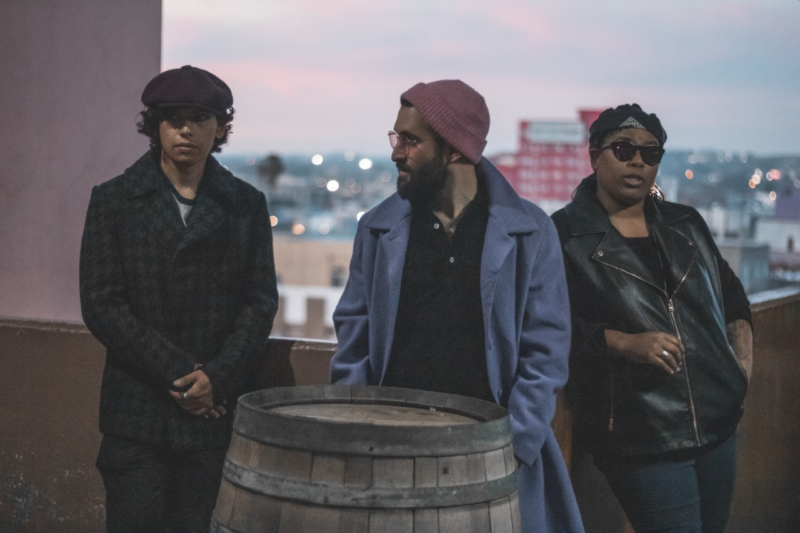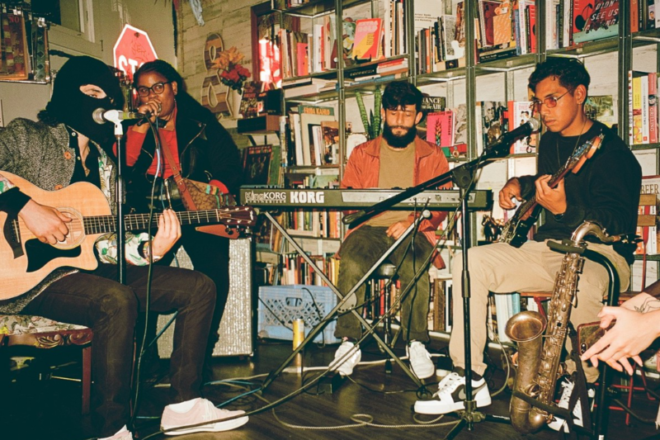
In San Diego’s often overlooked underground hip-hop scene, few voices standout like Tulengua, a bilingual, binational and multiracial group composed of recording artists Amari Jordan, Alan Lilienthal, and Jaime Mora.
Members of the group claim residency on both sides of the U.S.-Mexico border, with roots tethering the trio to San Diego and Tijuana. For the past several years, Tulengua has made a name for themselves in the underground hip-hop scene of the San Diego border region. Producing their own brand of music, the trio has crafted a sonic tapestry composed of different cultures, languages, and sounds that transcend borders and genres.
Since the group’s formation in 2018, Tulengua has been anything but predictable. Tulengua’s music features live instrumentation and sampling from a variety of genres such as hip-hop, psychedelic, progressive rock, soul, Spanish-language music and even obscure movie soundtracks. Their lyrics are bilingual and often carry a strong social commentary by regularly touching on topics of immigration, racism and the struggles of undocumented immigrants.
Their unique sound has brought them success and support from those who relate to the stories they tell, but the last two years have been difficult. The pandemic wreaked havoc for the performing artists. Music venues closed around the same time they released a new album. Then the border closed and separated the bandmates.
But now, Tulengua is in the middle of a rebirth. The group is exploring the concept of crowdfunding.
“Just like streaming changed the music industry, there’s a new wave of web3 technology bringing more freedom to musicians,” Lilienthal said. Web3 is an idea for a new iteration of the World Wide Web based on the blockchain, which incorporates concepts including decentralization and token-based economics. Lilienthal hopes that by using this technology the group can be transformed into a digitally tradable asset amongst fans via-tokens through the same block-chain technology utilized with NFT’s and cryptocurrency.
“We’re trying to imagine a world where our biggest supporters can in a sense be like our shareholders – where the binational community around us can grow as we grow,” he said.

A Desire to Connect Communities
The humble origins of the group trace back as the brainchild of Tulengua frontman Alan Lilienthal. Lilienthal and his family moved from Mexico City to San Diego when he was 8 years old.
Lilienthal was an avid musician from a young age and played in a number of local bands in various cities. He also maintained a revolutionary spirit. At the age of 21, at the suggestion of his brother, Lilienthal took a Greyhound bus out to New York City to take part in the Occupy Wall Street movement, a protest against economic inequality and the influence of corporate money in politics that began in Zuccotti Park, located in New York City’s Wall Street financial district, in 2011. Following New York, Lilienthal spent some time traveling abroad until he felt compelled to return home to San Diego.
By the time Lilienthal returned to the States, vitriol regarding the border and immigration had reached a zenith, propelled by the incendiary rhetoric of then Republican frontrunner Donald Trump. In the days and months following Trump’s election in 2016, Lilienthal and fellow rapper Slack Barrett began work on a cross-border musical collective. Although the collective didn’t have a solidified lineup, let alone a name, Lilienthal and Barrett were laying the foundations for what would eventually become Tulengua.
“At that point it wasn’t even a solid group, it was more like a loose collective of people from both sides of the border,” said Lilienthal, who at the time was doing cross border work. “I was seeing so much cooperation, fluidity and collaboration between both sides, but that wasn’t really being spoken about in the media. So we wanted to create something that showed the unity and community between both sides, and could represent the beauty that’s created when people come together despite their differences.”
Lilienthal and Barrett quickly began working on songs together, with the two emcees trading bars, going back and forth in both English and Spanish. “The first five or six songs were just us kind of processing our feelings about the political climate that was going on in America. You hear that because it was such a shit show, and we just wanted to write about what was going on,” Lilienthal recalled.
It was around the same time Lilienthal also met Amari Jordan, a local artist who had grown up in San Diego and was working on her solo career as an emcee in San Diego’s local hip-hop scene as well. The two met in a chance encounter at a Wu-Tang-themed rap battle in Barrio Logan, after Jordan battled local battle rap heavy weight Ric Scales. After witnessing Jordan go head to head against one of San Diego’s most versatile battle rappers, Lilienthal was compelled to introduce himself and eventually asked Jordan if she wanted to join the group. Jordan found the idea of joining a group (especially one regularly addressing topics of social justice) appealing and agreed to join Lilienthal and Barrett.
Shortly afterward, Lilienthal discovered Jaime Mora’s music on the music-streaming platform Soundcloud. “At the time the idea for Tulengua was for it to be a cross-border collective, so I wanted to find someone in Tijuana that also made beats. With Mora added to the line-up the group began work on the remainder of the project.
The group’s debut album, “Baja Funk,” received praise from both fans and local music critics upon its release in 2018. Tulengua received even more attention after the members decided to donate all profits from the project to Border Angels, a San Diego-based migrant’s rights nonprofit organization that serves the county’s immigrant community through various migrant outreach programs, including day laborer outreach and legal assistance. The group even collaborated with the org on a music video for their single, “Selva”. After “Baja Funk” completed recording, Slack Barrett moved to the East Coast, effectively leaving the group and solidifying Tulengua’s lineup as Lilienthal, Jordan, and Mora.

‘Music Is This Great Kind of Weapon’
Almost immediately Tulengua was hailed for both outspokenness on border issues and also for the group’s ability to break down language barriers as well as ethnic and racial stereotypes.
“Music is this great kind of weapon or tool that is so much more than entertainment. It’s this amazing vessel to inspire change and bring people together, so I always knew that whatever I did musically I wanted that element to be very present,” Lilienthal said. “The group was born from this political tension and all this bullshit that was being spewed from Washington, so from the very beginning I wanted to make it very clear what Tulengua stood for. Yes, it’s entertainment and it’s Hip-Hop, it’s fun, it’s a party, and it’s lit. But, it’s also being put at the service of something else that’s beyond just ego.”
Jordan also expressed the important role the group plays touching upon topics seldom discussed among most hip-hop artists.
“There’s so many people out there that don’t have a voice, so why not put forth a voice that they can attach themselves to whether they speak our language or not,” Jordan said.
Following a six song EP entitled “Feelins”, Tulengua released their sophomore effort in the spring of 2020. The group’s follow-up album “LOWKEYBANGERSVILLE” was a stark break from the group’s more old-school hip-hop oriented sound cultivated on “Baja Funk,” veering into more modern territory with more trap inspired and experimental production.
Lilienthal acknowledged that the group’s change of direction might turn some fans off, but stressed that pushing boundaries has always been a major component of the group’s dynamics
“We don’t ever want to just be in the ‘conscious rap’ box or the ‘underground’ box,” Lilienthal said. “We make music that we love. I think that the fact that we’re from both sides of the border, erasing boundaries, and bringing people together, that infuses anything we do with this weight that it’s more than only music.” Jordan agrees and believes that the group’s fluidity is what sets them apart. “We found a way to bridge not just hip-hop,” Jordan said.
Promotion for “LOWKEYBANGERSVILLE” was short lived however, three weeks after its release the country shutdown due to the COVID-19 pandemic, which effectively shut down all musical venues and placed any chance of doing live shows on hold.
When it became clear that the pandemic was not ending anytime soon Mora returned to his home in Rosarito before the border was closed. For almost a year the group was unable to gather.
Those obstacles, though, encouraged the group to embark on a new path with web3 technology. Soon, the group will be launching a crowdfund around the LENGUA token, which will essentially give fans who are holders access to unreleased music, shows, community events, and even allow fans the chance to vote on the direction of Tulengua’s musical and creative direction. Proving that even in the midst of a still uncertain climate surrounding the border, Tulengua is still inspired to continue the mission they embarked on back in 2018.
“We’ve all let go of a lot these past few years. This whole trip has always been about more than music for us. It’s about community, family, borderless dreams, and visions of a more united region.”
